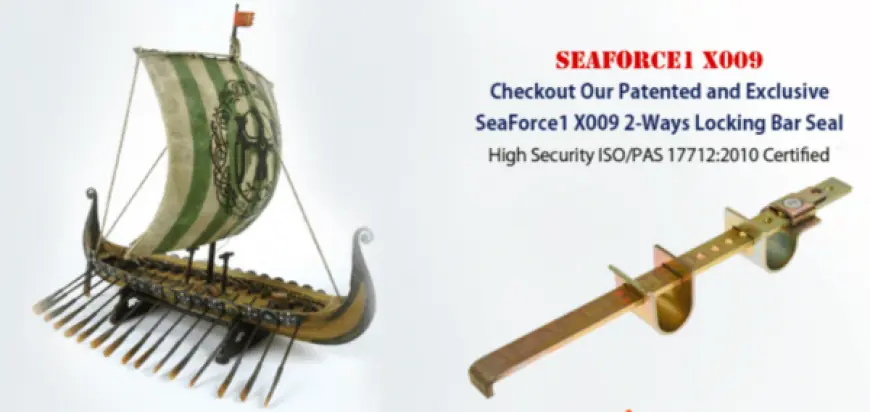How Locking Bar Seals, Barrier Seals Keep Loads Safe
Learn how locking bar seals, barrier seals protect cargo from theft, tampering, and damage during transport. A straight-up, useful shipping guide.

When you’re moving heavy cargo or high-value goods, a cheap plastic tag isn’t going to cut it. You need something tougher—something that says, “Don’t even try it.” That’s where locking bar seals, barrier seals come in.
They don’t just show tampering. They prevent it. Trucks, containers, railcars—if it's got doors and it's hauling something important, you’ll want these on board.
What Are Locking Bar and Barrier Seals?
Alright, let’s keep this simple. These are heavy-duty security seals designed to do two things:
-
Stop forced entry by physically blocking doors
-
Show clear signs if anyone tried to break in
They're made of strong metals—often steel or aluminum—and require tools like bolt cutters or grinders to remove. That’s not something someone can do quickly or quietly.
Compared to regular tamper proof seals, these offer a higher level of resistance. Think of it like the difference between a bicycle lock and a steel door.
Where They’re Used (And Why It Makes Sense)
You’ll mostly find these on:
-
Shipping containers
-
Freight trucks
-
Railway cars
-
Storage units or depot containers
Why here? Because these are the kinds of jobs where one missing item can cost thousands. Or where a security breach could hold up your whole shipment. These aren’t short-haul, low-risk moves. These are the big ones.
Companies shipping electronics, pharmaceuticals, chemicals, or bulk commodities use locking bar seals, barrier seals every day.
Different Types (Yes, There’s More Than One)
Not all barrier seals are the same. Depending on the job, you might need one type over another.
Standard Barrier Seals
These span the locking bars on a container. Once locked, there’s no opening that door unless you break the seal with serious tools.
Adjustable Barrier Seals
Some let you adjust the length to fit different door configurations. Handy if you’re sealing all kinds of trailers or shipping containers & more.
Locking Bar Seals
These wrap around the locking bars and bolt shut. They're compact but strong—often used with high security seals for shipping container seals to add extra layers of protection.
Bolt Combo
You can pair barrier seals with bolt seals for double-duty security. Slows down thieves and shows tampering clearly.
What Makes Them So Tough?
The materials and build.
-
Solid steel or alloy bodies
-
Tough coatings to resist rust or weather
-
Unique serial numbers for tracking
-
Single-use designs so you can’t re-close them unnoticed
Unlike lighter seals, you can’t twist or pry these off. You’ve gotta cut—and it’ll take time.
How to Install Them (It’s Not Complicated)
Even though they look rugged, putting one on is simple.
-
Align it across the door bars
-
Lock it using the built-in mechanism
-
Double-check it’s tight and can’t be slid or wiggled
-
Record the serial number (seriously, don’t skip this)
If you're using adjustable types, make sure there’s no slack. A snug fit means more security.
Also, make sure staff know how to check seals on arrival. A slightly bent bar, chipped paint, or out-of-place serial can mean someone tried to mess with it.
Why Use These Instead of Regular Seals?
It all comes down to risk.
Plastic or cable seals are fine for low- to medium-security jobs. But when you’ve got a high-value load, they’re just not enough. Thieves know how to bypass or fake standard seals.
Locking bar seals, barrier seals take that option off the table. They’re hard to fake, hard to remove, and easy to check.
They’re also great when you're trying to meet tough security rules—like customs, bonded warehousing, or compliance for US customs accepted cable seals.
Real Talk: What to Watch Out For
Even the best seal won’t help if you:
-
Forget to log the serial
-
Leave the seal loose
-
Use the wrong size for your container
-
Let it sit in extreme weather for months and it corrodes
So yeah, check your inventory, train your team, and replace old seals. A little prep goes a long way.
Where to Get Them
You can buy shipping security seals online without much hassle. Suppliers like American Seals carry all kinds—from barrier seals to bolt seals to full wide range of security seals for trucks.
If you’re unsure what to pick, start by thinking:
-
How valuable is the load?
-
What kind of container or truck is it?
-
Is this going across borders?
-
Do I need to meet security or inspection requirements?
Then browse based on those needs. A good supplier will show options clearly.
Locking Bar Seals, Barrier Seals and Long-Term Security
It’s not about paranoia. It’s about prevention. Seals like these aren’t just peace of mind—they're evidence. If anything goes wrong, you’ve got something to point to.
They’re used in industries that can’t afford tampering. Pharma. Electronics. Chemical freight. And now more logistics companies are starting to use them even for regular shipments, just to be safe.
Final Thought
Let’s be honest—locks won’t stop a pro if they’re determined. But locking bar seals, barrier seals slow them down, expose their attempt, and reduce the chance of success. That’s a win.
For serious shipments, they’re just part of the job now.
And when paired with the right setup—like tamper proof seals, bolt seals, or US customs accepted cable seals—they form a solid front line against theft or damage.
What's Your Reaction?
 Like
0
Like
0
 Dislike
0
Dislike
0
 Love
0
Love
0
 Funny
0
Funny
0
 Angry
0
Angry
0
 Sad
0
Sad
0
 Wow
0
Wow
0
















































